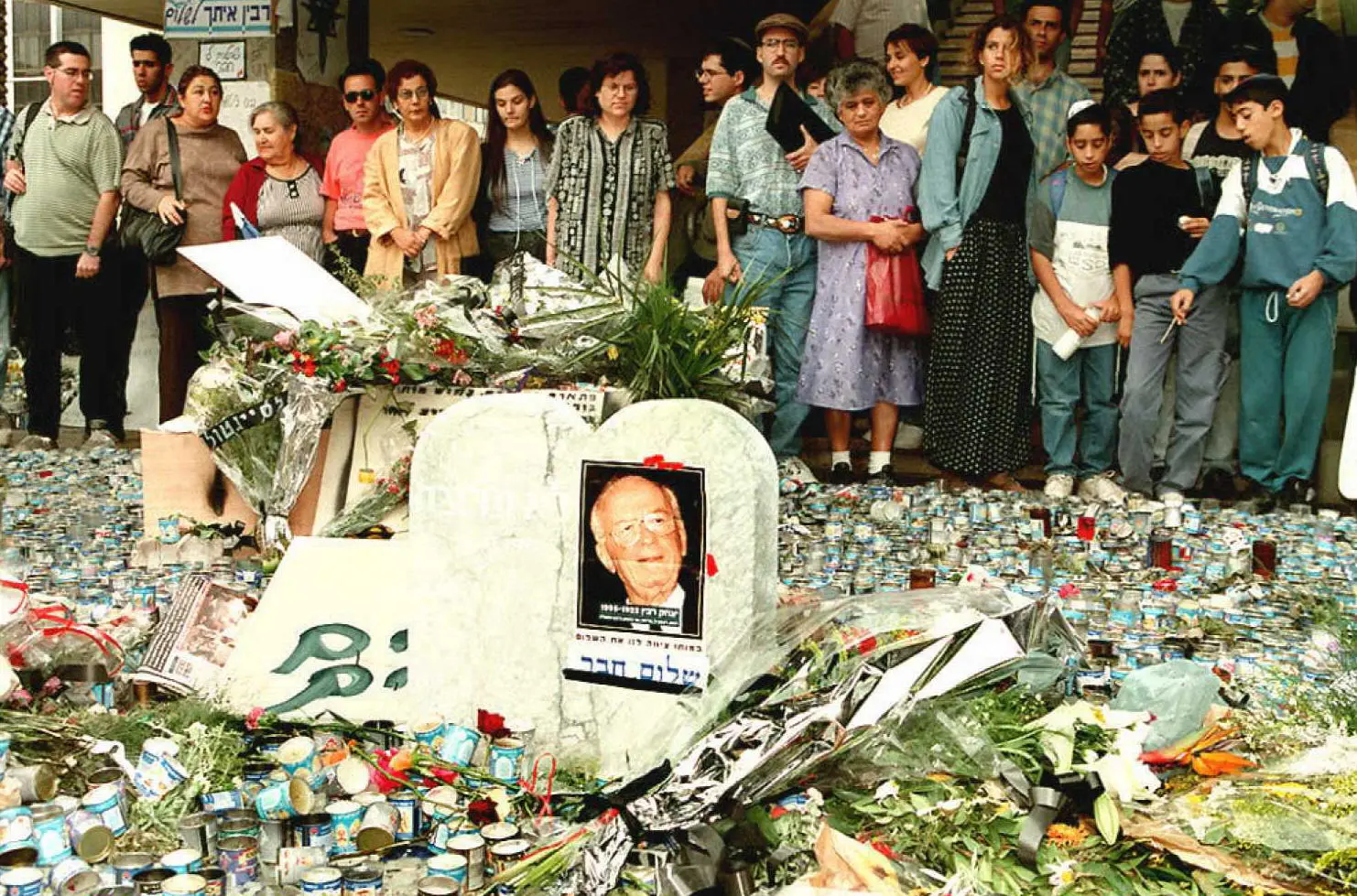Copyright thejc

On that Saturday evening 30 years ago the sky was crackling with early fireworks, the day before Bonfire Night, that idiosyncratic British commemoration of a failed assassination plot four centuries earlier, the details of which most of us will only be dimly aware. But 3,000 miles away an all too successful assassination was taking place that same November night in Israel. Its prime minister, Yitzhak Rabin, was gunned down at a peace rally in Tel Aviv by Yigal Amir, a fanatic who believed that the Oslo Accords signed with PLO leader Yassir Arafat in 1993 represented a danger to his countrymen. The murder had come amid increasingly bitter political division within Israel over the deal with the Palestinians. But it was all the more shocking in that Amir claimed religious sanction for his action, believing that Jewish law justified it. Months later, a commission headed by the president of the Supreme Court, Meir Shamgar, which had been set up to investigate the security failings over Rabin’s death, warned: “The reborn State of Israel must learn the lessons of Jewish history.” In particular, the commission cited two particular episodes from the past: the zealotry preceding the destruction of the Second Temple that had led to “bloodshed among brothers” and the assassination of Gedaliah, the governor appointed by the Babylonians to look after the remnants of the population following the destruction of the First Temple. Suggesting that modern Israel needed to do some soul-searching over the social and political climate in which the prime minister’s death had occurred, it quoted a saying from the Talmud: “Bad culture in a man’s home is worse than Armageddon.” Some two and a half millennia later, Gedaliah’s murder is still commemorated in the Jewish calendar, in the eponymous fast held the day after Rosh Hashanah. It is the last of the four fasts that mark the fall of the Temples but the reason for it is not as obvious as the other three: recorded in a few verses at the end of the Second Book of Kings and in chapters 40-41 of Jeremiah, it seems like an aftershock, merely a postcript to the national tragedy. When the Babylonians sacked Judah’s capital, “they burned down the house of God and tore down the wall of Jerusalem,” the Second Book of Chronicles records. “They burned all its palaces with fire and destroyed all its treasures”. Those carried off into exile in Babylon were enslaved. Compared to the calamity that befell the people as a whole, the fate of Gedaliah was not significant enough to rate even a mention in Chronicles. In the account in Jeremiah, Gedaliah tries to reconcile the Judeans to their new political situation, reassuring them, “Stay in the land and serve the king of Babylon and all will be well for you.” But his position is not secure. A Judean army officer, Jonathan, son of Kareah, warns him that Ishmael, son of Netaniah, acting in cahoots with the king of the Ammonites, is plotting to kill him. If that happens, Jonathan fears it will have terrible consequences. “Then all of Judah who have gathered to you will scatter and the remnant of Judah will be lost,” he tells Gedaliah. Jonathan offers to launch a pre-emptive strike but Gedaliah does not believe him and disaster follows. Not only do Ishmael and his followers kill Gedaliah but also the Judeans and Chaldeans (Babylonians) in his entourage. The remaining Judeans are now fearful of Chaldean retaliation and seek to flee to Egypt. However, Jeremiah intervenes and tells them that God wants them to remain in the land of Israel, promising that the king of Babylon will “show mercy toward you and return you to your lands”. If they continue their course and go to Egypt, “the sword that you fear will overtake you… and the famine that you worry over shall pursue you there… and you shall die.” But the people do not heed the prophet’s words and carry on to Egypt. Their flight marks the final defeat, the loss of Jewish presence in the land of Israel, and it is this that the death of Gedaliah comes to represent – an act that has lasting consequences for the nation. As Maimonides put it centuries later, “The ember of Israel that remained was extinguished, causing their exile to become complete.” And the long-term impact of the killing of Yitzhak Rabin, whose yahrzeit falls on Sunday night? Historians and political scientists will debate the extent to which it dented the prospects for peace. The Oslo process was already under strain. Hamas did its best to derail it with suicide bomb attacks; from the Israeli side, Baruch Goldstein massacred Palestinians at worship in the Cave of the Patriarchs in Hebron in 1994. With the taking of the life of the Israeli prime minister, extremism dealt its most serious blow. His death will continue to stand as a warning against allowing differences to harden into hatred. But perhaps we can wrest some hope from history. Less than 60 years after Gedaliah’s assassination, King Cyrus of Persia issued his decree for the exiles to return to Judea to rebuild the Temple. We can pray that well before the 60th anniversary of Yitzhak Rabin’s death, Israel will have entered a new, and happier, era. Image: Israelis mourn their murdered prime minister days after he was shot at a peace rally on November 4 1995 (photo: Getty Images)



